Saturday, June 29th, 2024
Tooth pain can be one of the most unbearable and debilitating experiences, disrupting daily activities and affecting your overall well-being. At Brookmere Dental Group, we understand how overwhelming this pain can be and are committed to helping our patients in Coquitlam find immediate and effective relief. This blog will explore the various causes of tooth pain, immediate steps you can take for relief, and long-term solutions to ensure your dental health remains optimal.

Tooth pain, or dental pain, can stem from numerous underlying issues. Understanding the cause is crucial in determining the best course of action for relief. Here are some common causes:
When tooth pain strikes, finding immediate relief is often the priority. Here are some steps you can take at home to alleviate the pain temporarily:
While home remedies can provide temporary relief, it is crucial to seek professional dental care to address the underlying cause of the tooth pain. Schedule an appointment with Brookmere Dental Group if you experience any of the following:
At Brookmere Dental Group, our experienced team provides a range of treatments to address the root cause of tooth pain and ensure long-term relief. Here are some common treatments we offer:
Prevention is always better than cure. Here are some tips to help prevent future tooth pain and maintain optimal dental health:
At Brookmere Dental Group in Coquitlam, we provide comprehensive dental care to help our patients achieve and maintain optimal oral health. Coquitlam Dentists’ team of experienced professionals is here to offer personalized care, from preventive services to advanced treatments for tooth pain and other dental issues.
We understand that dental pain can be overwhelming, and we strive to create a comfortable and welcoming environment for all our patients. Our state-of-the-art facility has the latest technology to ensure accurate diagnoses and effective treatments.
Tooth pain can be unbearable, but you don’t have to suffer in silence. By understanding the causes of tooth pain, taking immediate steps for relief, and seeking professional dental care, you can find lasting relief and protect your dental health. At Brookmere Dental Group, dental clinic in Coquitlam we are helping our patients achieve pain-free, healthy smiles. If you are experiencing tooth pain or have concerns about oral health, contact us and schedule an appointment. Your comfort and well-being are our top priorities.
Tuesday, April 30th, 2024
Introduction
When it comes to dental health, prevention is essential. Regular dental check-ups, good oral hygiene, and a healthy diet can help maintain oral health. However, there are times when unexpected dental issues arise, requiring immediate attention from a professional. Ignoring these symptoms can lead to further complications and discomfort. In this blog post, we’ll discuss some signs that indicate you need emergency dental care, emphasizing the importance of not ignoring these symptoms. As we explore this topic, Brookmere Dental Group is your trusted dental clinic in Coquitlam, where we prioritize your dental health and well-being above all else.
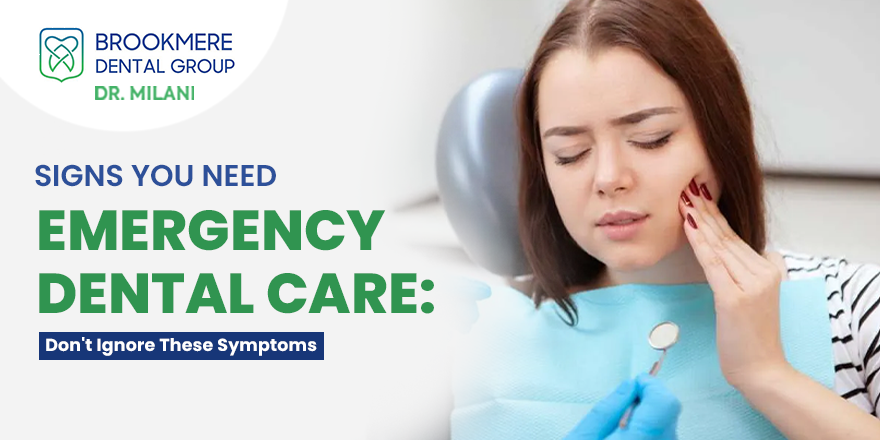
Tooth pain can range from mild discomfort to excruciating agony. While occasional tooth sensitivity or minor pain may not warrant emergency care, persistent and severe tooth pain could indicate a serious issue such as an infection or abscess. Ignoring persistent tooth pain can lead to further complications, including spreading the disease to surrounding teeth and tissues. If you’re experiencing relentless tooth pain, seeking emergency dental care promptly to address the underlying cause and alleviate your discomfort is crucial.
Swelling and inflammation in the gums, face, or jaw can indicate various dental problems, such as gum disease, infection, or an abscessed tooth. In some cases, swelling may accompany severe tooth pain or difficulty opening the mouth. Ignoring swelling and inflammation can exacerbate the underlying issue, potentially leading to severe complications. Prompt evaluation by a dental professional, such as Coquitlam Dentist at Brookmere Dental Group, can help diagnose the problem and prevent it from worsening.
While minor bleeding during brushing or flossing is relatively common, persistent or excessive bleeding from the gums could signal an underlying problem such as gum disease or trauma. Ignoring bleeding gums may result in the progression of gum disease, leading to gum recession, tooth loss, and even systemic health issues. Suppose you notice persistent bleeding from your gums, especially if accompanied by other symptoms such as swelling or pain. In that case, it’s essential to seek emergency dental care for proper evaluation and treatment.
Trauma or injury to the mouth can cause a tooth to become loose or completely knocked out. Immediate action is crucial to maximize the chances of saving the tooth. If a tooth becomes loose due to trauma or injury, avoid wiggling or touching it unnecessarily and immediately seek emergency dental care. Similarly, if a tooth gets knocked out, handle it carefully by the crown (top part), rinse it gently with dirty water, and try to reinsert it into the socket if possible. If reinsertion isn’t feasible, place the tooth in a container of milk or saliva and get to your dentist immediately for emergency treatment.
Chronic bad breath, or halitosis, can be embarrassing and may indicate an underlying dental issue such as gum disease, tooth decay, or oral infection. Similarly, an unpleasant taste in the mouth that persists despite oral hygiene practices could be a sign of dental problems. Ignoring persistent bad breath or an unpleasant taste may allow the underlying issue to progress, leading to more significant oral health issues. Seeking emergency dental care can help diagnose and address the root cause of these symptoms, restoring your oral health and confidence.
When faced with a dental emergency, choosing the right dental clinic can make all the difference in receiving prompt, effective care and restoring your oral health. Here are compelling reasons why you should trust Brookmere Dental Group for your emergency dentistry needs in Coquitlam:
At Brookmere Dental Group, we take pride in our team of experienced and skilled dental professionals committed to providing exceptional emergency dental care. Our dentists have undergone extensive training and possess the expertise to handle a wide range of dental emergencies with precision and compassion.
Our dental clinic is equipped with state-of-the-art facilities and advanced technology to ensure our patients receive the highest standard of care. From digital X-rays and intraoral cameras to modern treatment techniques, we utilize cutting-edge tools and equipment to diagnose and treat dental emergencies efficiently.
Whether you’re experiencing severe tooth pain, swelling, a knocked-out tooth, or any other dental emergency, our team at Brookmere Dental Group is here to help. We offer comprehensive emergency dental services to address various dental issues promptly, providing you with the relief and care you need when you need it most.
At Brookmere Dental Group, we prioritize the comfort and well-being of our patients above all else. From the moment you walk through our doors, our friendly staff will greet you with warmth and empathy. We understand that dental emergencies can be stressful, so we strive to create a supportive and welcoming environment where you can feel at ease during your visit.
At Brookmere Dental Group, we are committed to excellence in everything we do. Whether providing emergency dental care, preventive services, or cosmetic treatments, we are dedicated to delivering outstanding results and exceeding our patients’ expectations. When you choose Brookmere Dental Group for emergency dentistry needs, you can trust that you’re in good hands.
Your oral health is integral to your overall well-being, and recognizing the signs that indicate you need emergency dental care is crucial for maintaining optimal oral health. From persistent tooth pain and swelling to bleeding gums and loose teeth, ignoring these symptoms can lead to severe complications and discomfort. At Brookmere Dental Group in Coquitlam, we understand the importance of prompt and effective dental care, so we’re dedicated to providing emergency dental services to address your needs when they arise. Remember, don’t ignore the signs—seek emergency dental care promptly to safeguard your oral health and preserve your beautiful smile.
Wednesday, November 15th, 2023
Welcome to Brookmere Dental Group, your trusted partner in family dentistry. At Brookmere, we understand the importance of maintaining optimal oral health for every member of your family. Our dedicated team of experienced dentists and staff is committed to providing comprehensive and personalized dental care in a warm and welcoming environment.
In this blog, we’ll delve into the significance of family dentistry, our range of services, and why Brookmere Dental Group is the ideal choice for your family’s dental needs.
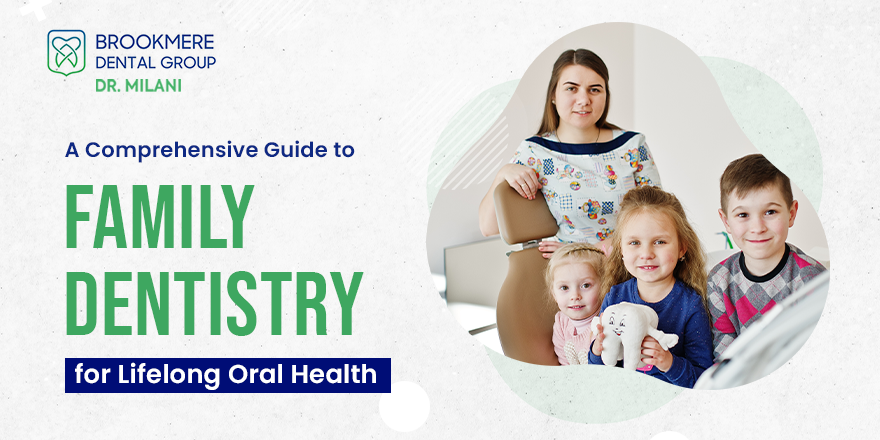
Family dentistry is a specialized branch of dental care that focuses on providing oral health services to individuals of all ages, from children to seniors. The primary goal of family dentistry is to establish a long-term relationship with patients and address their dental needs at every stage of life. At Brookmere Dental Group, we believe in the importance of preventive care and early intervention to ensure the overall well-being of your family’s oral health.
The Dental Service offered at Brookmere Dental Group
At Brookmere Dental Group, we offer a wide range of dental services to cater to the diverse needs of your family. Our services include:
Preventive Care Emphasis:
Prevention is key to maintaining optimal oral health. Our preventive care services include regular check-ups, professional cleanings, and personalized oral hygiene education. By focusing on preventative measures, we aim to help your family avoid dental issues before they become more complex and costly.
Our highly skilled dentists and support staff bring extensive experience and expertise to Brookmere Dental Group. We are dedicated to staying updated on the latest advancements in dental technology and techniques to provide the best possible care for our patients.
We have invested in state-of-the-art facilities and equipment to ensure our patients receive the highest quality dental care. From digital X-rays for precise diagnostics to modern treatment rooms designed for comfort, we prioritize creating a positive and efficient environment for our patients.
Regular dental check-ups are the cornerstone of preventive care. Here’s why they are crucial for maintaining your family’s oral health:
While regular dental check-ups are crucial, maintaining good oral hygiene at home is equally important. Here are some tips for building healthy oral habits for your family:
In conclusion, Brookmere Dental Group is your partner in achieving and maintaining optimal oral health for your entire family. Our commitment to comprehensive, patient-centered care, state-of-the-art facilities, and a team of experienced professionals make us the ideal choice for family dentistry in Coquitlam.
By prioritizing preventive care, addressing common dental concerns, and fostering healthy oral habits at home, we aim to support your family on a lifelong journey of smiles. Schedule an appointment with Brookmere Dental Group today and experience the difference personalized family dentistry can make in oral health and well-being. Remember, a healthy smile is beautiful, and we’re here to help your family achieve both.
Friday, September 29th, 2023
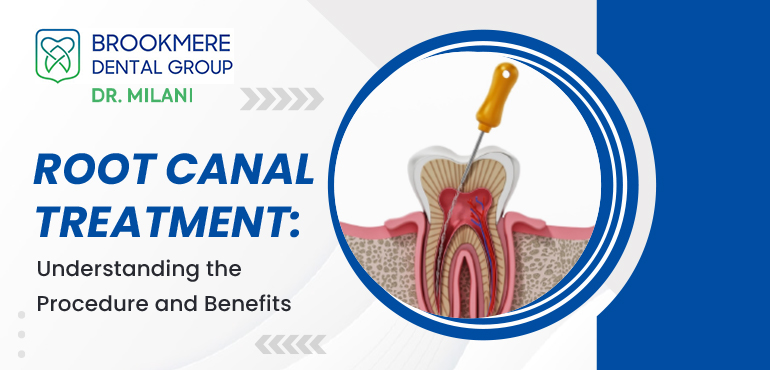
Are you suffering from a toothache that just won’t quit? Please don’t worry; we have the solution for you! Today’s blog post gives a guide about root canal treatment – a dental procedure that can save your pearly whites and alleviate excruciating pain. Prepare to bid farewell to those pesky toothaches and say hello to a healthier smile!
Root canal treatment is a procedure used to save a tooth that is severely damaged or infected. The process involves removing the damaged or infected tissue from the tooth, cleaning and sterilizing the inside, and then filling and sealing the tooth. Root canal treatment can be used to treat a wide variety of dental problems, including:
Root canal treatment is often the last resort for saving a damaged or infected tooth. Root canal treatment has a high success rate and can give patients their smile back.
There are many reasons why your dentist may recommend root canal treatment. The most common reason is to relieve pain from an infected tooth. Other reasons include:
Root canal treatment is a safe and effective way to treat these conditions and improve oral health.
There are many benefits of root canal treatment, including:
If your dentist recommends a root canal procedure, you may wonder what to expect. This article will overview the root canal procedure and offer some preparation tips.
A root canal is a treatment used to save a tooth that is severely decayed or infected. The procedure involves removing the damaged tissue inside the tooth and then filling and sealing the tooth.
Before the procedure, your dentist will take x-rays of your tooth to determine the extent of the damage. You will also be given local anesthesia to numb the area around your tooth.
During the procedure, your dentist will access the inside of your tooth through a small opening in the top of your tooth. The damaged tissue will be removed from inside your tooth using small instruments. Once all of the damaged tissue has been removed, your dentist will fill and seal the interior of your tooth.
After the procedure, you may experience some discomfort and sensitivity in your treated tooth. This is normal and should resolve within a few days. Your dentist may prescribe pain medication if needed. As recommended, following up with your dentist for any post-operative appointments is important.
After a root canal, taking care of your tooth is important to ensure a successful recovery. Here are some aftercare tips:
Root canal treatment is a dental procedure that can help save a tooth, preserve your smile, and reduce the pain associated with an infected tooth. While some fear this type of treatment due to its reputation as uncomfortable or painful, modern technological advances have made it less invasive and much more effective than ever before. With proper care and maintenance of your tooth, root canal treatments are seldom needed, but understanding the process will allow you to make informed decisions regarding what is best for you and your oral health.
Regarding ensuring the health and well-being of your tooth, the Brookmere Dental Group stands out as the premier choice for root canal treatment in Coquitlam. With a team of highly skilled and experienced dentists, we are dedicated to providing exceptional care and unparalleled expertise in every aspect of our practice.
At Brookmere Dental Group, the trusted dentists in Coquitlam your satisfaction is our top priority, and we strive to exceed your expectations at every visit. Choose us for root canal therapy and experience the difference our knowledge, expertise, and dedication can make in revitalizing your smile and restoring your dental health.
Thursday, August 24th, 2023
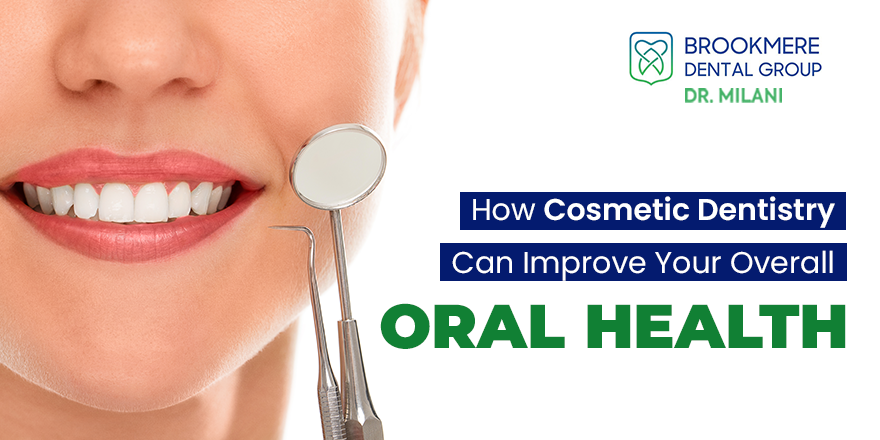
Cosmetic dentistry has revolutionized the way we perceive dental treatments. it’s about a holistic approach to oral health that encompasses aesthetics and functionality. Let’s explore how cosmetic dentistry can enhance oral health, making you healthier and more confident.
The alignment of your teeth and how they come together when you bite down are fundamental to oral health. Crooked or misaligned teeth can create nooks and crannies that are challenging to clean properly, leading to plaque buildup, cavities, and gum disease. Furthermore, an improper bite can cause excessive wear on certain teeth, leading to discomfort and potentially developing into temporomandibular joint (TMJ) disorders.
Cosmetic dentistry, especially orthodontic treatments like Invisalign or traditional braces, not only aligns your teeth for a beautiful smile but also corrects bite issues. By achieving a proper bite and evenly spaced teeth, you reduce the risk of these oral health problems. It’s like giving your mouth a structural upgrade, translating into a healthier foundation for your teeth and gums.
Dental problems such as chipped, cracked, or decayed teeth affect your smile’s appearance your oral health. When a tooth is damaged, it becomes more susceptible to further decay and may cause pain. Cosmetic dentistry procedures, such as dental crowns, bridges, and veneers, do more than improve aesthetics – they provide essential protection and structural support.
A dental crown, for example, covers a damaged tooth, preventing further deterioration and strengthening its structure. This restoration enhances your smile and ensures that the tooth can function correctly. By preserving your natural teeth, you maintain a healthy bite and avoid the potential cascading effects of tooth loss.
Gum health is often underestimated, but it plays a crucial role in oral health. Excessive gum tissue or an uneven gum line can contribute to gum disease and create areas where harmful bacteria thrive. Cosmetic procedures like gum contouring aim to create a harmonious balance between your teeth and gums.
Gum contouring not only improves the appearance of your smile but also supports healthier gums. By eliminating pockets where bacteria can accumulate, this procedure reduces the risk of gum disease and contributes to a more vibrant and balanced oral environment.
Tooth loss is a significant concern, not only for your smile but also for your oral health and overall well-being. When a tooth is lost, the underlying bone in the jaw begins to deteriorate. This can lead to a sunken appearance and affect the stability of adjacent teeth.
Dental implants, a leading cosmetic solution for tooth replacement, restore your smile and prevent bone loss. The implant, which replaces the tooth root, stimulates the jawbone, maintaining its density and structural integrity. This ensures that your facial features remain supported and adjacent teeth don’t disappear.
Undergoing cosmetic dentistry procedures often inspires individuals to become more committed to maintaining their improved smiles. This renewed focus on oral hygiene benefits the longevity of cosmetic work and has far-reaching effects on oral health.
Routine brushing, flossing, and professional cleanings become part of your daily routine, ensuring that your teeth and gums remain in optimal condition. A healthy oral environment reduces the risk of dental issues and provides a solid foundation for long-term oral health.
One of the hidden benefits of cosmetic dentistry is the thorough examinations that often accompany these treatments. Dentists have a keen eye for detail, and during cosmetic consultations, they meticulously assess the condition of your teeth and gums.
This focus on comprehensive evaluation allows dentists to identify underlying dental problems in their early stages. Catching these issues early means they can be treated before they escalate into more severe health concerns, whether a small cavity or signs of gum disease. Regular dental check-ups become a proactive measure for maintaining your oral health.
In conclusion, cosmetic dentistry goes beyond aesthetics; it’s a powerful tool for enhancing oral health. By addressing alignment, restoring damaged teeth, promoting gum health, preventing tooth loss, encouraging oral hygiene, and facilitating early detection of issues, cosmetic dentistry offers a comprehensive approach to a healthier smile. Consult with a qualified cosmetic dentist to explore the options that align with your oral health goals, and embark on a journey to a brighter, healthier, and more confident you.
Brookmere Dental Group, is your destination for cosmetic dentistry in Coquitlam. Our dedicated team prioritizes your overall oral health. From treatments like dental veneers and teeth whitening to innovative solutions such as dental implants. Experience the transformative impact of our cosmetic dentistry services.
Friday, July 14th, 2023
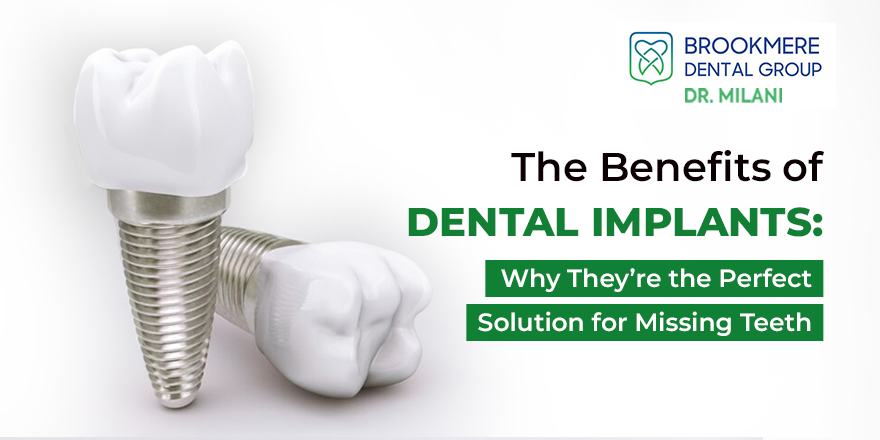
Are you tired of hiding your smile because of missing teeth? Say goodbye to self-consciousness and hello to confidence with dental implants! In this blog post, we’ll uncover the remarkable benefits of dental implants and why they are the perfect solution for missing teeth. From restoring your ability to eat, speak, and laugh without hesitation to preserving your oral health in the long run – these tiny wonders bring a whole new world of possibilities. So, sit back, relax, and get ready to discover how dental implants can transform your smile and your life!
Dental implants are a popular and effective solution for missing teeth. They are made to look, feel, and function just like your natural teeth, and they can last a lifetime with proper care. In addition to being a cosmetic improvement, dental implants can also improve your oral health by preventing jawbone deterioration and preserving the healthy bone structure around the implant.
If you are missing one or more teeth, contact our office today to schedule a consultation. We will be happy to answer any questions about dental implants and help you decide if they are the right solution for you.
There are many benefits to dental implants that make them the perfect solution for missing teeth. Dental implants are permanent, look and feel like natural teeth, and allow you to eat and speak normally. In addition, dental implants can help to preserve your facial structure and prevent bone loss in the jaw.
If you are considering dental implants, it is essential to consult with a qualified implant dentist to ensure that you are suitable for this treatment. Once your implant dentist has determined you are a good candidate for dental implants, they will work with you to develop a customized treatment plan.
The benefits of dental implants include:
There are several reasons why dental implants are the best solution for missing teeth, but they may not be suitable for everyone. If you’re considering alternatives to dental implants, here are a few things to keep in mind:
Bridge: A bridge is another common alternative to dental implants. Like dentures, bridges are usually less expensive than implants. However, Dental bridges require healthy teeth on either side of the gap to support them, and they can also cause problems with eating and speaking.
Partial Dentures: Partial dentures are similar to complete dentures but only replace a few missing teeth. They’re less expensive than complete dentures and easier to keep in place, but they still have some of the same disadvantages as dentures.
Dental Implants: Dental implants are the best solution for missing teeth because they’re strong, durable, and look natural. They also don’t require healthy teeth nearby to support them, and they won’t slip out of place when you eat or speak.
Dental implants are an excellent option for anyone who has missing teeth. They look and feel natural, last a long time, and can be used to replace one or several teeth at once. The benefits of dental implants go beyond aesthetics, though — they also help strengthen the jawbone and improve your oral health. If you’re looking for a solution for missing teeth, dental implants might be the perfect choice!
Brookmere Dental Group offers exceptional dental implants Coquitlam to restore your smile and improve oral health. Dental implants are a revolutionary solution for individuals with missing teeth, providing a long-lasting and natural-looking restoration. Our highly skilled and experienced team of dentists uses advanced technology and techniques to ensure precise and successful dental implant procedures. We strive to create a comfortable and welcoming environment for our patients where they can receive personalized care and attention. At Brookmere Dental Group, we are dedicated to helping you regain confidence in your smile through our top-quality dental implant services in Coquitlam.
Thursday, June 8th, 2023
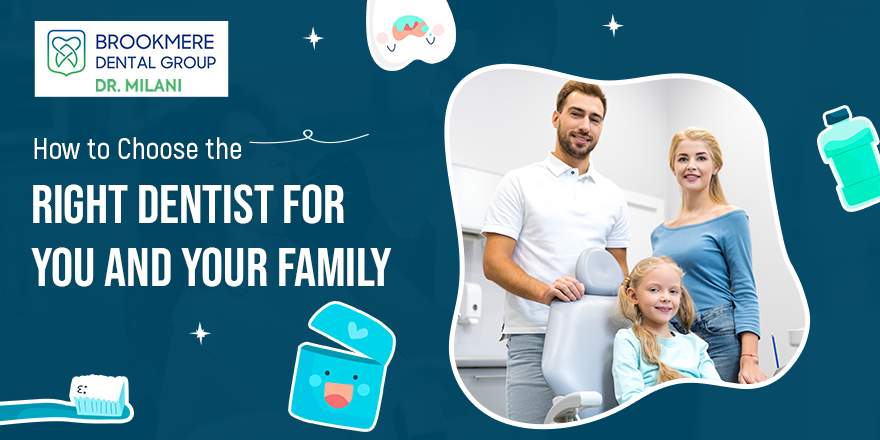
Finding a reliable and trustworthy dentist is crucial for maintaining your oral health and that of your family. The right dentist can significantly impact your overall dental experience, ensuring personalized care, comfort, and peace of mind. This blog will explore some essential factors to consider when selecting the right dentist for you and your family.
Start your search by seeking recommendations from family, friends, colleagues, or healthcare providers. Personal referrals often provide valuable insights into a dentist’s expertise, demeanour, and overall patient satisfaction. Take note of the recommendations and compile a list of potential dentists to consider.
Once you have a list of potential dentists, verifying their credentials and experience is essential. Look for dentists with the qualifications and licenses to practice in your area. Consider their years of experience and whether they have expertise in the specific dental treatments you and your family may require.
When selecting a family dentist, one of the most significant factors is the availability of comprehensive dental care services. It is advisable to choose a dentist who can meet all the dental needs of your family under one roof. Look for a dentist who offers a wide range of services, including teeth whitening, cleaning, dental implants, root canal treatment, tooth extraction, and preventative and cosmetic care. Opting for a dentist who can provide all these services will save you money and spare you the inconvenience of switching between multiple dentists.
Schedule an initial consultation or visit the dental office for a firsthand experience. The friendly and knowledgeable office staff who prioritize patient comfort and satisfaction are essential. Assess the cleanliness, organization, and overall ambience of the office. Additionally, pay attention to the dental equipment and technologies used, as modern and up-to-date facilities often provide a more efficient and comfortable dental experience.
A good dentist should prioritize effective communication and patient care. During your visit, evaluate the dentist’s ability to listen attentively, answer your questions, and explain dental procedures clearly and understandably. A dentist who takes the time to understand your concerns and provides personalized treatment options fosters a patient-dentist solid relationship built on trust and open communication.
Take the time to read patient reviews and testimonials, as they offer valuable insights into the experiences of others who have received treatment from the dentist. Look for consistent positive feedback regarding the dentist’s professionalism, expertise, and quality of care. Online platforms and dental association websites are excellent resources for accessing patient reviews.
Choosing the right dentist for you and your family is a decision that requires careful consideration. You can make an informed choice by seeking recommendations, verifying credentials, assessing services, and evaluating communication and patient care. A trusted dentist will ensure your family’s oral health needs are met with personalized care and attention. At Brookmere Dental Group, our team of dedicated professionals is providing exceptional family dentistry in Coquitlam tailored to the unique needs of our patients. Trust us to be your partner in achieving optimal oral health and maintaining beautiful smiles for years to come.
Tuesday, March 21st, 2023
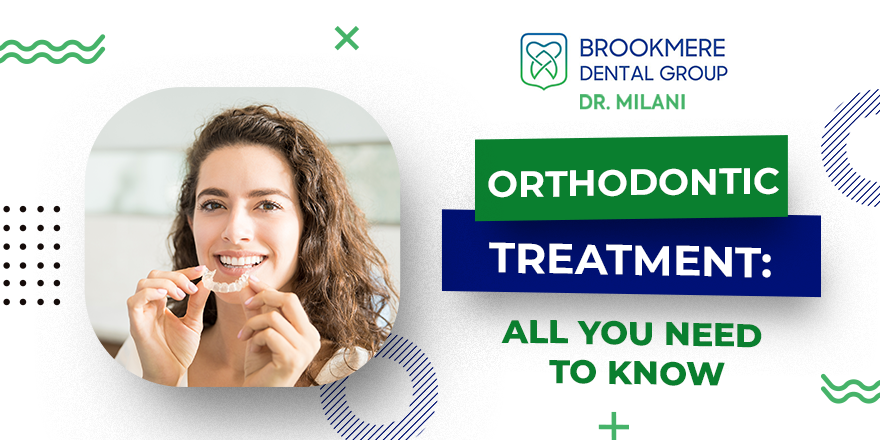
Orthodontic treatment is a type of treatment that focuses on correcting malocclusions or misalignments in the teeth and jaws. Orthodontic treatment can improve the function and appearance of the teeth, as well as prevent dental problems such as tooth decay, gum disease, and jaw pain.
There are many types of orthodontic treatments available, ranging from traditional braces to clear aligners. In this blog post, we will discuss everything you need to know about orthodontic treatment.
Consultation: The first step in the orthodontic treatment process is to schedule a consultation with an orthodontist. During the consultation, the orthodontist will examine your teeth and jaws, take x-rays and photographs, and discuss your treatment options.
Treatment Plan: Once the orthodontist has evaluated your teeth and jaws, they will develop a treatment plan that is customized to your individual needs. The treatment plan will include the type of orthodontic appliance that will be used, the length of treatment, and the estimated cost.
Placement of Orthodontic Appliance: The next step in the orthodontic treatment process is to place the orthodontic appliance. This may involve placing brackets and wires on the teeth, taking impressions for clear aligners, or placing lingual braces on the back of the teeth.
Adjustments: Once the orthodontic appliance has been placed, the orthodontist will schedule regular appointments to make adjustments to the appliance. These adjustments may involve tightening the wires on traditional braces or providing new sets of clear aligners.
Retainers: After the orthodontic treatment is complete, the orthodontist will provide a retainer to maintain the new position of the teeth. Retainers may need to be worn for several months or even years to prevent the teeth from shifting back to their original position.
If you are looking for any kind of orthodentic treatemnet in Port Coquitlam, consider Brookmere Dental!
Saturday, December 31st, 2022
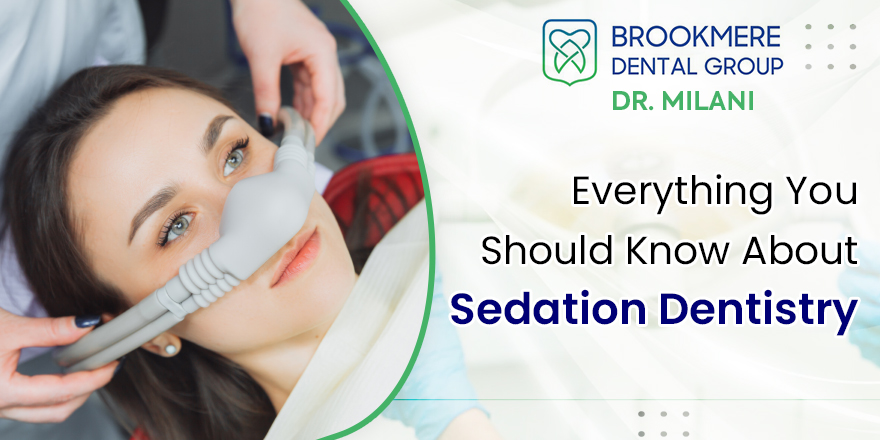
According to The Journal of the Canadian Dental Association, about 22 percent of patients experience extreme fear or anxiety about seeing the dentist. In fact, dental anxiety is so common that there’s a name for it: odontophobia. While it’s perfectly normal to feel some level of nervousness before a dental appointment, for those with odontophobia, the fear is more intense and can prevent them from seeking necessary dental care. If you have dental anxiety, sedation dentistry may be a good option for you. Sedation dentistry uses medication to help patients relax during dental procedures. It’s safe and effective, and it can make even the most anxious patient feel at ease. In this blog post, we’ll explore the top six reasons to consider sedation dentistry for your next procedure.
If you have ever avoided going to the dentist because of fear or anxiety, you are not alone. Millions of Canadians experience some level of dental phobia, making it one of the most common fears in the country.
But what if there was a way to ease your fears and make your dental appointments more comfortable? That’s where sedation dentistry comes in.
Sedation dentistry is a type of dental care that uses medication to help patients relax during treatment. There are different levels of sedation, from minimal to deep, and your dentist will work with you to determine the best option for you based on your level of anxiety and the type of procedure being performed.
Relaxation: One of the main reasons people choose sedation dentistry is the simple fact that it helps them relax. If you have ever had a bad experience at the dentist or are just naturally anxious about dental procedures, sedation can help put your mind at ease.
Less pain: Many people associate going to the dentist with pain, but sedation can actually help reduce your perception of pain. This is especially helpful for procedures that may be more uncomfortable, such as getting a tooth pulled or having cavities filled.
shorter appointments: Because sedation allows you to relax and not feel as much pain, procedures that would normally take multiple visits can often be done in just one appointment.
There are different types of sedation that dental professionals can use, and the type that is best for a patient depends on their level of anxiety, medical history, and the procedure being performed. The three most common types of sedation used in dentistry are inhaled sedation, oral sedation, and IV sedation.
Inhaled Sedation: Inhaled sedation, also known as laughing gas, is a mild form of sedation that is administered through a mask placed over the nose. Patients who receive inhaled sedation will remain awake during their procedure but may feel light-headed and relaxed. This type of sedation is often used for children or adults with mild anxiety.
Oral Sedation: Oral sedation involves taking a pill before your appointment to help you relax. The pill can be taken at home or at the office, depending on the strength of the medication. Patients who receive oral sedation will likely remain awake during their procedure but may feel drowsy or groggy. This type of sedation is often used for adults with moderate anxiety.
IV Sedation: IV sedation is administered through a small IV in the arm and works quickly to help patients relax. Patients who receive IV sedation may not remember their procedure afterwards and will need someone to drive them home.
There are many benefits to sedation dentistry. Perhaps the most obvious benefit is that it can help to ease dental anxiety and fear. For many people, the thought of going to the dentist is enough to cause a great deal of stress and anxiety. Sedation dentistry can help to take the edge off these feelings and make the dental experience much more pleasant.
In addition, sedation dentistry can be very helpful for those who have difficulty getting numb or who have a low tolerance for pain. It can also be used for lengthy or complex dental procedures that would otherwise be too difficult or uncomfortable to complete without sedation.
Overall, sedation dentistry can make dental care much easier and more comfortable for both patients and dentists alike. If you have been avoiding the dentist due to fear or anxiety, sedation dentistry may be a good option for you.
There are a few potential side effects of sedation dentistry, but they are typically mild and temporary. The most common side effect is drowsiness, which can last for a few hours after your appointment. You will need someone to drive you home after your appointment if you are sedated. Other potential side effects include:
Most people tolerate sedation dentistry well and do not experience any serious side effects. However, it is important to tell your dentist if you have any medical conditions that could potentially be affected by sedation.
If you’re one of the many people who experience anxiety or fear when it comes to visiting the Dentistry in Port Coquitlam, you may be a candidate for Sedation Dentistry. This type of dentistry can provide you with a way to receive the dental care you need while feeling relaxed and comfortable.
Contact Brookmere Dental Group – If you’re looking for a dental office that offers sedation dentistry in Coquitlam, look no further than Brookmere Dental in Port Coquitlam. Our team of experienced and caring dental professionals can help you receive the treatment you need while ensuring your comfort throughout the entire process.
Tuesday, November 29th, 2022

Wisdom Teeth. Sometimes when you least expect it, those pesky third molars start to emerge from the sides of your mouth. For many people, this can be a stressful and painful process, but don't worry! In this blog post, we'll cover some wisdom teeth pain recovery tips from our family Dentistry in Coquitlam.
If you're among the 70% of people in Canada who have wisdom teeth, you may be all too familiar with the pain and discomfort they can cause. While some people never experience any problems with their wisdom teeth and can keep them healthy with regular brushing and flossing, others may develop cavities, gum disease, or other problems that require treatment. Impacted wisdom teeth are especially prone to causing problems, as they can crowd or damage adjacent teeth.
Wisdom teeth are the third and final set of molars that most people get in their late teens or early twenties. They're called wisdom teeth because they come in at a time when you're old enough to (hopefully) have some wisdom.
While getting your wisdom teeth can be a painful experience, there are ways to minimize the discomfort and speed up the recovery process. Here are some tips on how to recover from wisdom teeth pain:
If you are looking for a Family Dentistry in Coquitlam, Brookmere Dental can help by providing dental services that can improve the health of your teeth and gums. We offer a wide range of dental services, including teeth whitening, braces, and oral surgery. We also provide emergency dental services for those who need immediate care. Our team of experienced Coquitlam dentist and dental hygienists are dedicated to providing you with the best possible care. We accept most insurance plans, and we offer financing options to make payment easy.
If you’re looking for a one-stop solution to your wisdom teeth pain in Coquitlam, look no further than Brookmere Dental Coquitlam dentist.
Our team of experienced dental professionals can help to assess your individual situation and recommend the best course of treatment. We offer a full range of wisdom teeth services, from extractions to implants, and we’ll work with you to ensure that you get the care you need.
Don’t let wisdom teeth pain hold you back – contact Brookmere Dental today to book an appointment.
There are a few preventative measures that can be taken to help reduce the pain associated with wisdom teeth. First, it is important to maintain good oral hygiene. This means brushing and flossing regularly, as well as using mouthwash. Secondly, it is important to eat a healthy diet and avoid sugary foods and drinks. Lastly, if you are experiencing pain, it is important to see a dentist or oral surgeon as soon as possible to determine if the wisdom teeth need to be removed.
